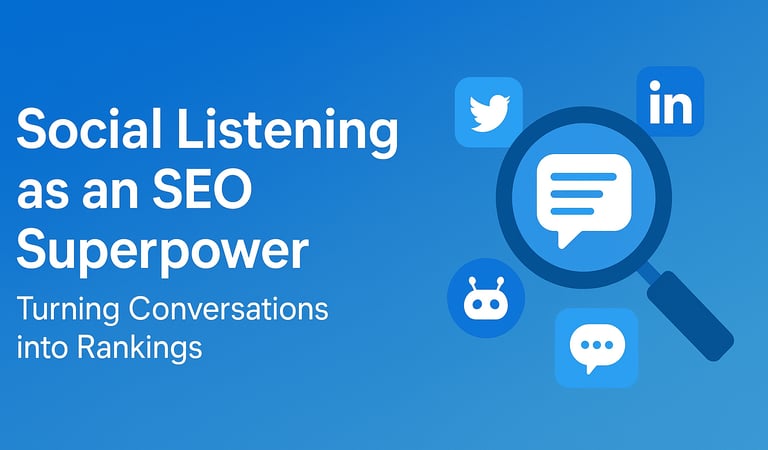Social Listening as an SEO Superpower: Turning Conversations into Rankings
Discover how social listening is transforming SEO in 2025 by uncovering real-time user language, trend insights, and long-tail opportunities for higher rankings.
6/2/20253 min read


Social Listening as an SEO Superpower: Turning Conversations into Rankings
For years, SEO has relied on keyword tools, backlinks, and on-page optimization. But in 2025, a new advantage is redefining how smart brands grow visibility — social listening.
No longer limited to brand mentions, social listening has become a powerful SEO accelerator. It helps marketers capture authentic user language, uncover long-tail opportunities, and create real-time, high-intent content — the kind that matches exactly what audiences are already talking about.
This isn’t about replacing traditional SEO. It’s about supercharging it with live audience insight.
Why Social Listening Matters for SEO in 2025
Traditional keyword tools show historical data — what people used to search for. Social listening flips that by analyzing real-time conversations across platforms like Reddit, X (Twitter), LinkedIn, Threads, Discord, Quora, and even Indian platforms like ShareChat or local WhatsApp groups.
Here’s why it’s becoming a must-have:
Real audience language → People search how they speak, not how marketers assume. Social listening bridges that gap.
Early trend detection → Conversations surface search trends weeks before they spike on Google Trends.
Sentiment intelligence → Understand whether users are curious, confused, or frustrated.
Privacy-friendly insights → Since it’s based on public conversation, it’s cookie-free and future-proof.
According to a 2024 HubSpot study, brands that integrated social listening into SEO saw a 27% increase in long-tail keyword visibility within 90 days.
From Conversations to Keywords: The Workflow
Turning chatter into SEO opportunities requires structure. Here’s how to do it step-by-step:
Step 1: Capture Conversations
Track relevant hashtags, community forums, subreddits, review sites, and local language discussions.
Tools: Brandwatch, Talkwalker, Sprinklr, Mention, Hootsuite.
Step 2: Extract Keyword Opportunities
Identify recurring questions, pain points, and phrases people use. Cluster these into informational, navigational, and transactional intent groups.
Step 3: Validate with Search Data
Cross-check keywords using SEMrush, Ahrefs, or Google Keyword Planner. Spot “hidden gems” — low-volume but fast-rising conversational terms.
Step 4: Build Content Around Insights
Create FAQ-style content mirroring community discussions.
Align blog titles with conversational phrasing.
Use schema markup to target featured snippets and voice searches.
Practical SEO Applications of Social Listening
Own the Long-Tail: Capture queries like “best CRM for freelancers who hate spreadsheets” before competitors.
Find Content Gaps: Turn negative feedback or common frustrations into valuable blog topics.
Win Featured Snippets: Natural, conversational language matches how Google interprets queries.
Strengthen EEAT: Engaging in community discussions builds Experience, Expertise, Authority, and Trust.
Metrics That Prove ROI
To measure the true impact of social listening-driven SEO, track:
Growth in long-tail keyword ranking
Increase in click-through rate (CTR) from natural-sounding meta titles
Organic traffic from new conversational keywords
Lower bounce rates (content that matches user intent)
Number of trending queries captured before competitors
Example: A Pune-based SaaS brand used social listening to identify new user concerns on Reddit, creating 3 targeted blog posts. Within two months, they ranked for 12 new long-tail keywords and saw a 35% increase in organic leads.
Pitfalls to Avoid
Chasing irrelevant trends unrelated to business goals
Over-relying on automation instead of human interpretation
Ignoring platform nuances — what works on Reddit might flop on LinkedIn
Prioritizing search volume over search intent
The Future: Conversational SEO
As Google’s AI Overviews and Search Generative Experience (SGE) evolve, the web is moving toward conversational discovery. Authentic phrasing, tone, and emotional nuance are becoming ranking factors.
Social listening is now the bridge between what people say and what they search — giving brands a live feedback loop for content creation
Conclusion: SEO With Its Ear to the Ground
In 2025, SEO isn’t just about keywords — it’s about context, authenticity, and timing.
By integrating social listening, marketers can:
Anticipate audience demand
Create hyper-relevant content
Capture long-tail opportunities early
Strengthen digital authority in an AI-first world
Want to see what your audience is already asking online?
Get a “Social Listening + SEO Opportunity Audit” from our team and uncover untapped keyword gold.
Brands that listen deeply will not only rank higher — they’ll resonate stronger, turning visibility into trust, and trust into long-term authority.


